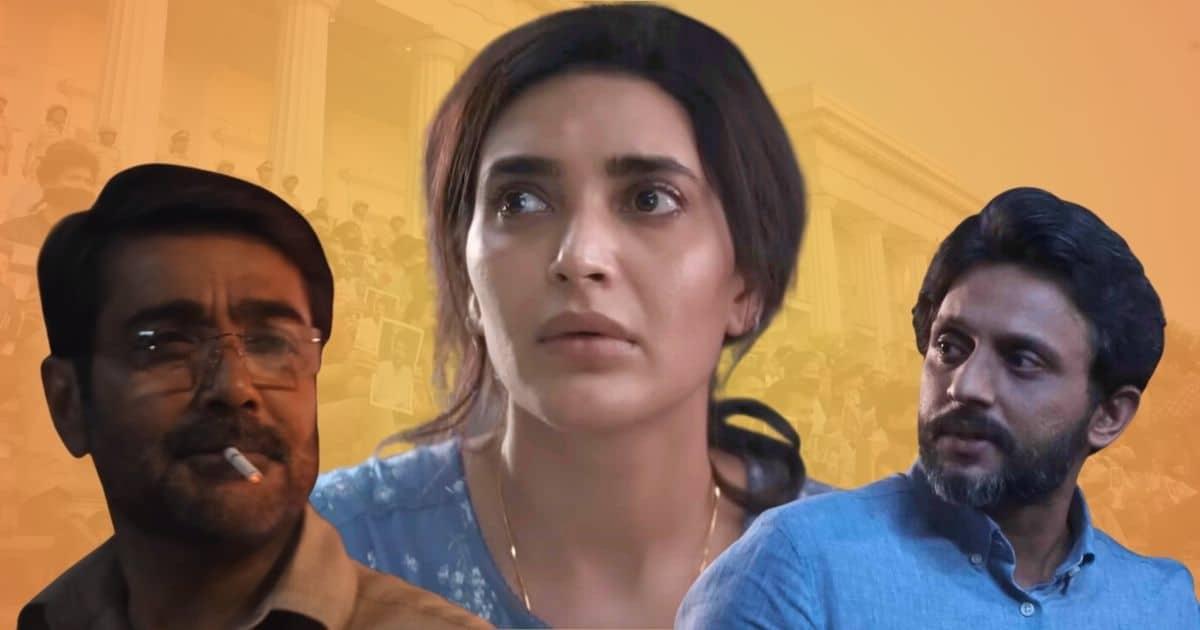Netflix’s enthralling series, Scoop, draws inspiration from former crime journalist Jigna Vora’s memoir, Behind Bars in Byculla: My Days in Prison. Set against the backdrop of Mumbai’s underworld, the show takes viewers on a suspenseful journey through the intertwined lives of journalists, gangsters, and corrupt cops.
With an immersive narrative and a stellar cast, Scoop delves into the complexities of crime journalism, highlighting the pursuit of truth and the risks faced by those seeking to expose the dark underbelly of society.

The Intriguing Beginning
Scoop takes off in 2011, introducing us to Jagruti, a tenacious and determined crime journalist. Portrayed as a fictional character based on Jigna Vora, Jagruti embarks on a gripping journey after receiving a tip about a gang-related shootout in Mumbai. Her rival and mentor, Jaideb Sen (based on Jyotirmoy Dey), hints at a larger conspiracy involving gangsters and corrupt police officers. Fuelled by her ambition and armed with a network of informers, Jagruti sets out to uncover the truth, driven by a relentless pursuit of justice.
Characters and Performances
Scoop boasts a talented ensemble led by Prosenjit Chatterjee, who delivers a captivating performance as Jaideb Sen. Chatterjee portrays Sen’s character with solemn magnetism, capturing the essence of a seasoned and influential crime journalist.
Karishma Tanna’s portrayal of Jagruti Pathak, a determined and ambitious crime journalist, is commendable. Tanna brings strength and vulnerability to the character, effectively conveying women’s challenges in a male-dominated field.
Harman Baweja, as JCP Shroff, adds an intriguing layer to the series. Baweja delivers a compelling performance, portraying Shroff as a palpably predatory law enforcement officer. His portrayal exudes power and authority but hints at hidden motives and a complex inner world.
Zeeshan Ayub’s portrayal of Imran, a significant character in the series, is another standout performance. Ayub brings depth and authenticity to Imran, showcasing his loyalty and unwavering support for Jagruti. His chemistry with Karishma Tanna is palpable, adding emotional depth and intensity to their scenes.
The supporting cast, including the actors playing gangsters, corrupt cops, and informers, deliver powerful performances that add layers of intrigue and suspense to the narrative. Each character is carefully crafted, enabling viewers to empathize with their struggles, motivations, and moral dilemmas.
Hansal Mehta’s Directorial Prowess
Hansal Mehta’s directorial prowess shines as he deftly brings to life the complex world of crime journalism. Known for his exceptional storytelling skills and ability to delve into the intricacies of human emotions, Mehta delivers by presenting a panoramic account of urban jeopardy and corruption through intricate plotlines that intertwine the lives of journalists, gangsters, and corrupt officials.
With a leaner and meaner approach than his previous acclaimed series, Scam 1992: The Harshad Mehta Story, Mehta maintains the same level of wit and verisimilitude that has become his signature. Co-written by Mrunmayee Lagoo Waikul and Mirat Trivedi, with dialogues by Karan Vyas, the dialogues crackle with sharpness, capturing the essence of Bombay-Gujarati culture and providing a glimpse into the everyday lives of the characters.
Prison scenes
The gruesome prison scenes leave a lasting impact on viewers. Mehta’s skilled direction and attention to detail bring these scenes to life, immersing the audience in the harsh realities of life behind bars and taking us back to Urmila Matondkar’s frightening journey in prison in Shriram Raghvan’s Ek Haseena Thi. With his signature gritty and realistic approach, Mehta captures the brutality and despair that exist within the prison system, eliciting a range of emotions from the viewers.
Scam 1992 and Scoop Similarities
In Scam 1992, Mehta portrays the real-life story of Harshad Mehta, the infamous stockbroker who orchestrated one of the largest financial scams in Indian history. The series delves into the intricacies of Mehta’s rise and fall, highlighting how he became a scapegoat for the more significant systemic issues within the financial sector.
Did you miss these stories?
Similarly, in the Netflix series Scoop, Mehta explores the theme of the scapegoat through the character of Jagruti, a crime journalist who finds herself framed for a crime she did not commit. As she investigates a larger conspiracy involving gangsters and corrupt officials, Jagruti becomes a target, manipulated, and used as a scapegoat to protect those genuinely responsible.
Through both Scam 1992 and Scoop, Mehta highlights the dangers of scapegoating. He exposes the flaws in our tendency to simplify complex problems by blaming a single person or group, obscuring the larger systemic issues that require examination and reform. By exploring these themes, Mehta prompts viewers to question their own biases and encourages a deeper understanding of the complexities of human behavior and the dynamics at play in various institutions.
Possible flaw
Some viewers may find one flaw in Scoop is the sudden awakening of consciousness among certain characters, particularly journalists and law enforcement officers like JCP Shroff. Throughout the series, these characters are shown as being complicit in corrupt practices and turning a blind eye to the truth. However, there are moments when they unexpectedly become aware of their actions and develop a sense of morality. While this can be seen as a positive character development, the abruptness of this transformation may seem unrealistic or lack proper justification.
Scoop may not cater to viewers seeking a casual and easy watch. Still, it offers an intellectually stimulating viewing experience for those who are willing to invest their attention and engage with the complexities presented on screen. It is a series that invites discussion and analysis, appealing to viewers who enjoy being intellectually challenged and appreciate the intricacies of a well-crafted narrative.



